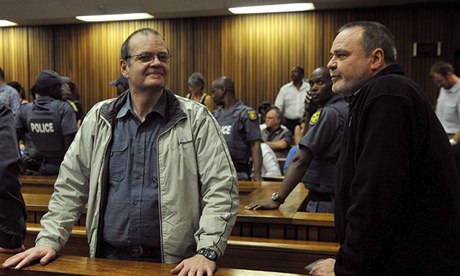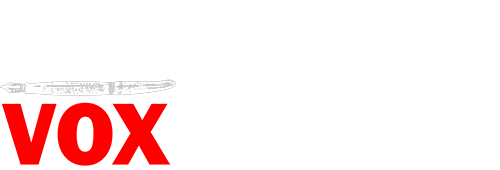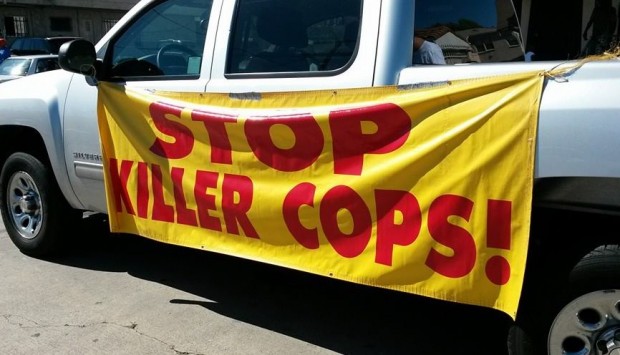 In the sixties, people in South Africa that thought like this crew thought they were going to jail Nelson Mandela for the rest of his life for what they considered treason. Now people who think like them are going to jail for 10 to 35 years for trying to kill him.
In the sixties, people in South Africa that thought like this crew thought they were going to jail Nelson Mandela for the rest of his life for what they considered treason. Now people who think like them are going to jail for 10 to 35 years for trying to kill him.
Guardian
Around barbecues and over fast food they had conceived a plot to assassinate Nelson Mandela and drive black people out of South Africa by leaving a trail of food parcels along a major road.
More than 10 years later, the humbled white supremacists Boeremag, whose craving for a return to racial apartheid led them to commit high treason, finally learned their fate in a packed wood-panelled courtroom on Tuesday.
The group’s alleged mastermind, a former university lecturer called Mike du Toit, was jailed for 35 years. Nineteen other members of his militia were also imprisoned for between five and 35 years, although nine walked free having served time.
The sentencing marked the end of one of the longest trials in South African history and, at about 36m rand (£2.27m), one of the most expensive. It was also the first treason trial since the dawn of multiracial democracy in 1994. The outcome was welcomed by the governing African National Congress but condemned by hardline white interest groups who claim they are marginalised in the young democracy.
The sentencing came after 20 members of the Boeremag, or white farmer force, were last year found guilty of treason for a plot, in the late 1990s and early 2000, to violently overthrow the government. The Boeremag’s “bomb squad” – Herman van Rooyen, Rudi Gouws and brothers Johan, Kobus and Wilhelm Pretorius – were also found guilty of culpable homicide and conspiring to murder Mandela.
They had planted a bomb on a road Mandela was going to take for a visit to a school in Limpopo province, but the plot was foiled when the anti-apartheid leader changed plans to take a helicopter to the school.
Several of the Boeremag members were charged with causing nine explosions at various sites in Gauteng, South Africa‘s richest province in October 2002, with most blasts taking place in the township of Soweto, south of Johannesburg. A mother, Claurina Mokone, was killed when a piece of steel dislodged by a homemade bomb detonated on a railway line landed in her shack.
The court had heard how the Boeremag’s plot, dreamed up around barbecues and in fast-food restaurants, suggested driving South Africa’s black majority out of the country and into neighbouring Zimbabwe by lining a major national road between the two countries with food parcels. It had also proposed sending 1.2 million people of Indian origin back to the subcontinent by boat.
Despite the absurdity of the schemes, judge Eben Jordaan, who considered more than 61,000 pages of evidence, said South Africa would have seen massive bloodshed and chaos if the Boeremag’s coup had been successful. They had large car bombs ready for targets in the city centres of Pretoria and Johannesburg and were planning further attacks when they were caught.
Two of the accused had died since the trial started and one was in a nursing home after suffering a series of strokes. Other members of the Boeremag – who include former engineers, medical doctors and military officers – saw their lives fall apart during the 10-year trial. Families were broken, careers destroyed and finances wiped out.
The ANC welcomed the sentences. “These thugs and racists got what they deserved,” said Jackson Mthembu, its national spokesperson. “We cannot, in a democracy, have people who want to assassinate the sitting president or anyone else for that matter. It’s a very good example for other racists that it is not acceptable.”
He added: “Those individuals who harbour racist sentiments are very few in South Africa. Even our white compatriots are taken aback by these fringe groups. They frown on these actions. We have gone a long way and are able to hold each other’s hands and work for a better South Africa. This is a sentiment held by South Africans black and white.”
South Africa’s 5 million whites continue to enjoy on average better pay and life chances than the black majority almost 20 years after Mandela won the country’s first democratic election. But some whites argue that they are marginalised and violently targeted. Earlier this month a few hundred demonstrators waved apartheid-era flags and posters of dead farmers in a “Red October” march in Pretoria.
Frans Cronje, of the South African Institute of Race Relations, said: “Our view is that this trial has been a good test for South Africa’s young democracy. When it started nearly 10 years ago, the ability of the government to neutralise the threat of the white right was untested. Although the trial took a long time to complete, the rule of law prevailed in the end with a free and transparent process.
“While the threat of a co-ordinated attack by the white right as envisioned by the Boeremag is highly unlikely, the possibility of a lone-wolf attack is a real danger. It is simple to carry out and does not require training or special skills.”


More Stories
AT LEAST ONE OF THE COPS WHO KILLED EZELL FORD HAS STRUCK BEFORE
PEOPLES' MONDAY HONORS FALLEN VICTIMS IN NYC
PA STATE REP: 'A WHITE NATIONALIST…IS A LOT DIFFERENT THAN A WHITE SUPREMACIST'